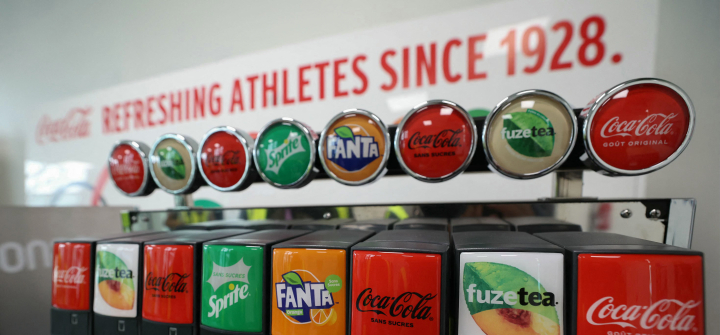Coca-Cola’s Ongoing Olympic Sponsorship Is Bad for Everyone’s Health
In June 2017, McDonald’s and the Olympic Games ended a multi-decade sponsorship arrangement barely halfway through an eight-year contract extension. A key reason for the dissolution of this partnership was the consistent bad press from public health groups pointing out the International Olympic Committee’s hypocrisy: taking payment from the fast-food behemoth while espousing its commitment to health.
Fast forward seven years. As Paris gets ready to host the 2024 Summer Olympic Games starting Friday, July 26, the IOC’s website boasts that the food vendors will be more locally sourced, sustainable, and all-around healthful. These new commitments appear to be completely in line with the IOC’s vision to “build a better world through sport.”
That declaration of improved standards seems deeply at odds with the fact that, elsewhere on the site, Coca-Cola is touted as a steadfast partner, as it has been since 1928. The company is a leading producer of sugary drinks, which have been linked to obesity and largely preventable diseases such as type 2 diabetes and heart disease. New research has continued to support this association, with scientists concluding, “… consumption of total, sugar-sweetened, and artificially sweetened soft drinks was positively associated with all-cause deaths.”
And the harms of these products are not limited to health: Food and beverage companies are continually ranked as the largest producers of single-use plastics.
Against this backdrop, how has Big Soda continued to share the spotlight with the Olympic Games? One explanation is nakedly economic. News of the IOC’s new multi-billion-dollar joint sponsorship deal with Chinese dairy giant Mengniu, another a colossal beverage company, underlines how these agreements support the IOC’s global expansion goals. However, Big Soda’s enduring partnership can also be seen as a master class in “sportswashing,” or using an athletic event to burnish an individual or organization’s reputation. By continuing its partnership with an athletic event that pulled in 3 billion viewers during the 2020 Tokyo Olympics, Coca-Cola has convinced the world to turn a blind eye to its tarnished reputation.
For example, Coca-Cola’s corporate bio on the Olympics site briefly and benignly refers to its products’ “refreshing” effect on athletes, officials and spectators, before detailing its investment in youth sports and overtures toward enhanced sustainability. These claims stand in stark contrast to the millions of kids worldwide with limited access to affordable, healthful food and beverages who will have Big Soda’s advertisements beamed into their homes throughout the Olympic broadcast. During the 2016 Rio Games, Coca-Cola pushed out advertisements for their sugar-sweetened beverages aimed directly at teens, reaching over 21 million individuals in their target age group. It’s hard to imagine that outsize influence placing today’s youth on a path toward healthy lives.
In continuing its sponsorship agreement with Coca-Cola, the IOC stands in direct opposition to its stated values. By characterizing the ethically compromised partnership as one that simply, “... builds public excitement ahead of each edition of the Games,” the health and environmental harms associated with Big Soda are conveniently ignored. It is a profit-driven marriage of convenience masked as a virtuous bridge between nonprofit and for-profit powerhouses, one in which the allure of sports is a pretext for exposing millions of children to unhealthy products.
Yet, until IOC leadership hears loud and clear from the global community that Coca-Cola is no more welcome as part of its programming than Big Tobacco or McDonald’s, their 96-year union will carry forward indefinitely, regardless of its downstream consequences.
We encourage sports fans—along with concerned young people, parents, public health and environmental advocates, members of the media, and athletes themselves—to demonstrate the global opposition to this longstanding sponsorship. A newly launched campaign, “Kick Big Soda Out of Sport,” organized by leading global health organizations, sheds light on the health and environmental harms of Big Soda. Alongside the campaign, a petition urging the IOC to terminate its sponsorship with Coca-Cola is currently gathering signatures. As more people add their voices and share with their networks, the reach of the campaign and petition will expand, creating greater awareness, outrage and advocacy.
At the conclusion of the 2024 Summer Olympic Games, the groups responsible for “Kick Big Soda Out of Sport” will present the petition to the IOC and make the clear and cogent case that Coca-Cola is just as out of place in a sporting environment as McDonald’s. For the health of all, it’s time to get soda off the field.
The authors of this op ed are partners of the “Kick Big Soda Out of Sport” campaign – a group of leaders of public health organizations in support a campaign to end Big’s Soda’s sponsorship of sporting events globally.
Join the 50,000+ subscribers in 170+ countries who rely on Global Health NOW summaries and exclusive articles for the latest public health news. Sign up for our free weekday newsletter, and please share this link with friends and colleagues.
A soft drinks dispenser at the Olympic village where some athletes will be housed at Saint-Denis, a northern suburb of Paris. July 2, 2024. Emmanuel Dunand / AFP via Getty




